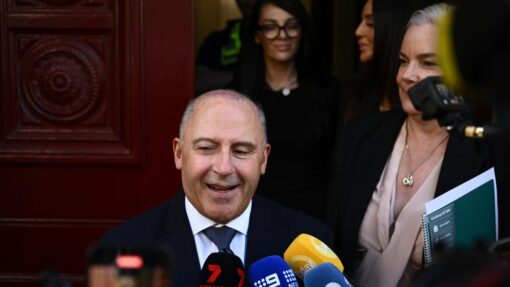Top lawyer admits ‘uncertainty’ of robodebt legality
Andrew Brown |
A top government department lawyer has admitted there was concern about the possibility of the robodebt scheme’s unlawfulness while it was in operation.
The second day of the final hearing block of the robodebt royal commission heard on Tuesday from Paul Menzies-McVey, who is the former chief counsel for the Department of Social Services, one of the government agencies that administered the debt recovery scheme.
Mr Menzies-McVey was questioned on legal advice prepared by law firm Clayton Utz, which stated the means of using annual tax office data to calculate average earnings and automatically issue welfare debts was illegal.
He told the commission that while there was concern within the department about the advice, he was confident the issue would be resolved.
“There was … an undesirable level of uncertainty about the legal underpinnings of the scheme, but steps were already under way to resolve that uncertainty in the best way possible,” he said.
Mr Menzies-McVey said he first became aware of the legal advice in May 2019, upon becoming chief counsel at the Department of Social Services.
He said he was surprised such advice was sought from an independent law firm and not from government solicitors.
“If the matter needed to be escalated to a minister or cabinet down the track, then (government solicitor) advice would have been required,” he said.
“Getting advice from Clayton Utz would have possibly just been only a first step of what would need to have been a two-step process.
“I would have thought that if (the department) was concerned about the program at some point, it was perfectly appropriate to get advice.”
The commission is examining who knew about the legality of the scheme and how robodebt was implemented.
The scheme operated between 2015 and 2019, despite concerns during that period that the averaging of income data was unlawful.
It recovered $750 million from 380,000 people, some of whom took their own lives due to the impact of the debt notices.
The commission also heard on Tuesday from Michael Johnson, the assistant secretary at the Office of Legal Service Coordination.
Mr Johnson admitted the procedures that assessed the legality of the robodebt scheme did not function as intended.
“A retrospective review of what happened here can only reach one conclusion and that’s the system didn’t work,” he said.
“Objectively in hindsight, with what we know today, at that date, it was definitely a significant legal issue.”
Mr Johnson said the office almost requested a report on robodebt’s legality in 2017, but department officials at the time assured them the scheme was lawful.
Commissioner Catherine Holmes said there had been many failures of processes which led to the scheme being allowed to continue.
“(The Department of Human Services) ran a program which they had been warned at the outset, because it involved averaging as the default position, would not conform with the social security act,” she said.
“They went ahead and did it anyway, the ombudsman was easily deflected, (Mr Johnson) was easily deflected. What does this say about our checks and balances?”
Mr Menzies-McVey told the commission his mind did not turn to the potential consequences for those who had received debt notices while the department was seeking advice from the solicitor-general on the scheme.
“My view was I was happy that the matter was going to be finally determined by the solicitor-general, or indeed, potentially by a court,” he said.
“Certainly, I would be uncomfortable with the department oversighting a program that was unlawful of any type, especially a large program such as this.”
The former chief counsel said he also assumed that senior department secretaries were aware of the Clayton Utz advice on the legality of robodebt.
AAP


